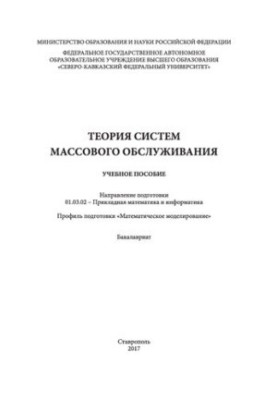Theory of mass service systems: training manual. Direction of training 01.03.02 - Applied mathematics and computer science.
 Instant download
Instant download
after payment (24/7)
 Wide range of formats
Wide range of formats
(for all gadgets)
 Full book
Full book
(including for Apple and Android)
The Theory of Mass Service Systems: A Tutorial . Direction of preparation 01. 03. 02 - Applied Mathematics and Computer Science" is an indispensable source of knowledge for students, graduate students and specialists seeking to understand more deeply the principles of the functioning of modern service systems and their mathematical modeling. Created by a team of authors with extensive experience in the field of applied mathematics, computer science and queue theory, this tutorial is a comprehensive and systematic presentation of key concepts, methods and practical aspects of the theory of mass service systems. This book reveals to the reader a complex , but exciting world of queues, Application processing and resource allocation systems , Allows you to understand , how these mechanisms work in real-world settings — from telecommunications networks and computer systems to traffic flows and customer service in commercial organizations The author’s team successfully combines theoretical foundations with practical examples, which makes the book especially valuable for those who want not only to master mathematical models, but also to learn how to use them to solve actual problems in the field of information technology and applied mathematics. The book “The Theory of Mass Service Systems” is perfect for senior students, graduate students and teachers, as well as specialists involved in the design and optimization of service systems . It is designed for an audience that is interested not only in theoretical aspects, but also in practical methods for assessing the effectiveness of systems, modeling queues and analyzing their behavior in conditions of uncertainty. In the process of reading, the reader is immersed in the fascinating world of mathematical modeling, where each formula and graph helps to understand how to manage flows and minimize costs. The book pays special attention to modern trends in the development of mass service theory, such as the analysis of systems with priorities, modeling of distributed systems and the use of stochastic analysis methods. The author's style is distinguished by clarity of presentation and logical consistency, which facilitates the perception of even complex concepts. In addition, the book presents current algorithms and methods of numerical analysis, which makes it a valuable tool for those who are engaged in the development of software solutions and automation systems. An equally important aspect is that the book "Theory of Mass Service Systems" is part of a series of training materials in applied mathematics and computer science, which confirms its status as a reliable training tool for training specialists of the new generation. It helps students and young scientists not only to master the theoretical foundations, but also to develop analytical thinking, to learn how to apply the acquired knowledge to solve practical problems related to the optimization of service systems in various fields of activity. If you are looking for a book that combines scientific rigor and practical value, if you are interested in understanding how queue systems work and how they can be improved to improve the quality of service and reduce costs, “The theory of mass service systems: This book will be a great help for you.... This is a publication that will not only expand your knowledge, but also inspire new ideas and research in the field of applied mathematics and information technology. In general, this tutorial is not just a collection of theoretical provisions, but a full-fledged guide to the complex world of mass service systems, which will help you become a professional in the field of modeling and optimization of modern information systems. It is worth having at hand anyone who seeks a deep understanding of the processes underlying effective service systems, and wants to put this knowledge into practice to achieve new heights in their professional activities.
LF/641541293/R
Data sheet
- Name of the Author
- Collective of authors
- Language
- Russian















